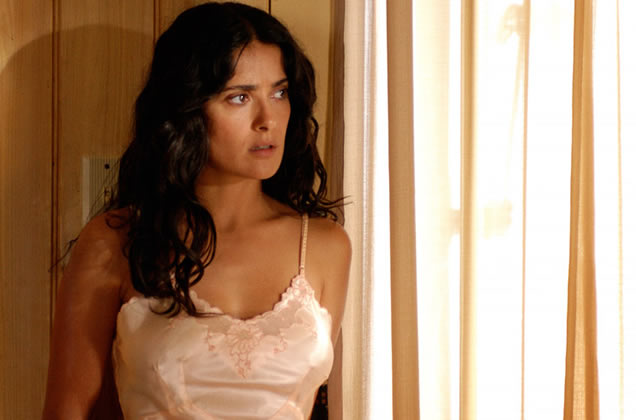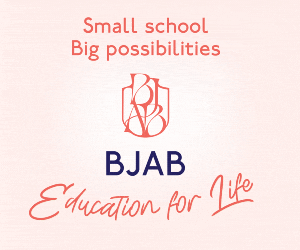Salma Hayek waited a long time to become a wife and mother. She ultimately found true love and happiness with French billionaire Francois-Henri Pinault, CEO of PPR, one of the world’s largest luxury goods and clothing manufacturers. For a time, Salma was all too happy to take a break from Hollywood and devote herself to her husband and their beloved daughter, Valentina, now seven. But lately she’s been taking the plunge in Hollywood again, having played a Mexican drug lord in Oliver Stone’s Savages (2012) and now in two new films, Everly and How to Make Love Like an Englishman.
But the project closest to her heart is Khalil Gibran’s The Prophet, an animated film based on the Lebanese poet and philosopher’s classic text of the same title. Hayek spent three years producing the film and also serves as one of its narrators alongside Liam Neeson. She hopes it will send a positive message to audiences of all faiths.
“Khalil Gibran wanted to bring people from all religions and cultures together,” Hayek says. “He believed that people could find a way to understand each other and live peacefully together. His message is very beautiful and I think it’s the right time in the world for people to see this kind of movie. We need to be reminded that we as human beings we can unite behind shared values like love, our bond with nature and our innate love of our children.”
The Prophet, directed by Roger Allers (The Lion King) is particularly close to Hayek’s heart because Gibran was Lebanese, just like Hayek’s father, and she had long dreamed of trying to bring The Prophet to life as a feature film. She chose nine of the world’s top animation directors to bring their own vision to nine different ‘chapters’ of the film that each in their own way attempt to translate Gibran’s poetry to the screen.
Hayek, 47, lives with her husband in London (having relocated to the UK from Paris following the harsh taxation laws passed in Pinault’s native France) with their daughter Valentina and Pinault’s two children, Francois, 17, and Mathilde, 14, from a previous marriage.
Together
Salma, The Prophet is a very personal project for you, isn’t it?
Hayek
I’d wanted to make this film for some time. I’m Lebanese on my father’s side and The Prophet was my grandfather’s favourite book and he kept it at his bedside. For me, being able to bring the work of Khalil Gibran to audiences all over the world and especially to a younger generation is such an honour for me. When I re-read the book as an adult, it brought back so many deep memories of my grandfather and how close I felt to him. I was only six when he died, but I still have this strong image of the book that was so important to him. This film is my way of paying tribute to my own heritage, to my grandfather, and to the work of a great poet and philosopher.
Why do you think Gibran’s message is so important?
Gibran is not interested in preaching to people. Even though he’s Lebanese and Christian, his work is not aimed at Christians or any one religion. His book is philosophical and spiritual and tries to explore themes that draw on our common humanity. It’s a very important text, and I think young people in particular will respond to it. The book has sold over 100 million copies around the world since it was first published (in 1923), and I hope our film will have a very positive impact on the way people see life.
Have you shown parts of the film to your daughter?
She’s seen a lot of it. One night she even started singing a song written by Damien Rice for the film while she was in the bathtub. And that happened just after she was singing a famous song from a Disney movie. That gave me a lot of encouragement because we want children to be able to enjoy this film and appreciate the beauty of the images and the stories that are being told. There’s a wonderful naiveté to our story. Some parts are nostalgic and will make people think of the kind of magic that you see in Disney movies. Children will sense that and so will adults. You will start to feel more like a child again and let your imagination flow the way a child experiences life.
There is so much conflict and tension and killing taking place in the Middle East these days. What impact can a film like this really have?
When there is so much fighting and conflict it becomes even more important to send messages of peace and universality. This film talks about shared values and our basic connection with nature and love. I hope children will be encouraged to embrace and follow their creativity and sense of imagination and that it will give them some hope that they can find beauty in the world. Who knows whether one child who sees this film might be inspired to become the next Gandhi or Nelson Mandela? It’s important to give young people some sense of what can be done to unity people around basic human values.
This was not an easy film for you to finance, was it?
It took some doing and now the hardest part is really to sell it to distributors who believe in it and want to be part of a very unique project. I had a difficult time making Frida (her Oscar-nominated 2002 biopic of Mexican artist Frida Kahlo in which she played the title role), and The Prophet was just as big a challenge. But I am confident that people around the world will be able to see a film that is very different from other kinds of movies and has something good to say about the world.
What touches you specifically about the different stories in the book?
It’s changed over time. As a teenager, I was really drawn to the poem about love. Then in my 20s I was drawn to reading and re-reading the poem about good and evil. Today I love reading the one about children. That’s why I think the book speaks to people of all ages and generations.
Has Valentina been aware of all the work you’ve been putting into making the film?
(Laughs) Of course. I even took her to Cannes with me (in May) as her reward for her mother having spent so much time working on the film while in the house with her. She has been living with me while I’ve been making the film for the last three years. She’s heard me on the phone talking to producers in Los Angeles almost every night before her bedtime because that’s when it’s morning over there. I’ve also shown her a lot of the drawings that the animators made for the film and so this is the first of her mother’s movies that she’s really been able to get to know.
Is Valentina getting used to being photographed alongside you?
I’ve taken her on the red carpet with me and she loves having her picture taken and posing. She thinks it’s a game and she gets to play with her mother. (Laughs) I’d rather have it that way than make her afraid of the photographers because that’s a part of what comes with her mother’s work.
How do you see your life evolving these days?
I want to rest more next year! I’ve done a few films as an actress and making The Prophet was very exhausting at times. But I knew I would regret it if I didn’t at least try to get it made and now I have this beautiful legacy to leave to my daughter. Children should be aware of their roots and I wanted Valentina to be able to appreciate her Lebanese heritage just like I have always connected to that side of my family.
Have you been inspired by anyone on your Mexican, mother’s side of your family?
My grandmother has been very inspirational to me. She was a chemist and a scientist and she would develop her own beauty creams. She was a strong woman, a woman who was ahead of her time. She always had a sense of her independence and wanting to make her mark in life.
Do you feel you’ve lived up to that kind of image of a strong woman?
I feel I was able to make a good career for myself, and in the end I was able to enjoy having a family life that I always wanted to have. I know many women who haven’t been able to find that for themselves. And it’s hard on women who would like to have children but haven’t found a good partner. It’s not easy, I understand that.
Is it tough managing your various roles in life as wife, mother, producer, and actress?
It’s very stressful and I’ve learned to take time for myself when things are getting to be too much for me. It’s important that women take an afternoon for themselves or go see friends and not let yourself feel overwhelmed when you want to be the most perfect mother and do everything for your child or children. With Valentina I’ve had to be careful about not fussing over her too much. Children need to know that you love them and how deeply you care about them but you also have to leave them time to play on their own or read and things like that. But I worried so long about missing out on having my own family and then once she was born I wanted to do everything for her and make have the best life possible. Sometimes that’s an impossible challenge you set yourself because if you want to have a career you can’t always be with your child all the time or as much as you would like. But I try to take her with me everywhere I never spend more than a week away from her no matter how busy I am.
You seem very happy and enthusiastic in life. Have you always been that way?
No, I went through a lot of anxiety when I was younger. I’m very happy today but it took me a long time before I felt really comfortable with who I am. I had a lot of complexes about my body and starting out in Hollywood you see yourself in comparison to all these tall and thin actresses and it was tough for me. I also struggled with trying to find roles because of my appearance and my accent, and sometimes all that wears you down, especially on the inside. At one point it sunk in that I should stop worrying about my body so much and just try to focus on my work and trying to have a good life. That’s a big lesson I learnt, and I’m very grateful that when I did meet the right man I was really ready to become a wife and mother. Sometimes in my thirties I was worried that maybe I wasn’t going to have a family. But now that I do, I’m so grateful for everything.







